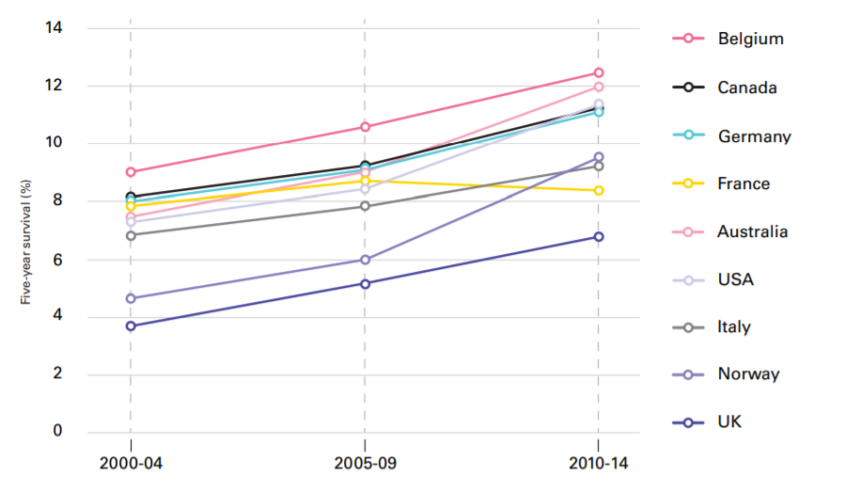Pancreatic cancer statistics
Please note that this page contains data on pancreatic cancer survival. These are general statistics for large groups of people, so they can’t tell you what will happen in your own case or that of a loved one.
Incidence and mortality
Pancreatic cancer is the 10th most common cancer with 10,449 people diagnosed with pancreatic cancer in the UK in 2018.
Pancreatic cancer is the 5th biggest cancer killer in the UK with 9,000 deaths every year.
Five-year survival
Pancreatic cancer has the lowest survival of all common cancers, with five-year survival less than 7%. Five-year survival of pancreatic cancer in the UK lags behind the rest of the world, with the UK ranking 29th out of 33 countries with comparable data in CONCORD-3 (Figure 1).

Stage at diagnosis
Early diagnosis is crucial to improve survival outcomes for people with pancreatic cancer; with one-year survival in those diagnosed at an early stage six times higher than one-year survival in those diagnosed at stage four. However, most people with pancreatic cancer are diagnosed at a late stage.
1 in 5 people with pancreatic cancer are diagnosed at stage one and stage two.
80% (4 in 5) are diagnosed at stage three and stage four.
1 in 2 people are diagnosed with pancreatic cancer via an emergency, such as A&E
Access to pancreatic cancer treatment
Surgery is the only treatment with curative intent for pancreatic cancer while chemotherapy and radiotherapy have also been shown to improve survival in late stage pancreatic cancer. However, most people with pancreatic cancer will receive no active treatment (including surgery, chemotherapy or radiotherapy).
7 in 10 people with pancreatic cancer do not receive any active treatment.
1 in 10 people with pancreatic cancer will receive potentially curative surgery.
2 in 10 people will receive chemotherapy.
UK Nations
Pancreatic cancer | Scotland
Cases: There were 811 new cases of pancreatic cancer diagnosed in Scotland in 2018, with an incidence rate of 15.5 per 100,000.
Deaths: There were 811 deaths from pancreatic cancer in Scotland in 2018, representing a mortality rate of 15.7 per 100,000.
Stage at diagnosis: 3 in 5 people are diagnosed at a late stage where potentially curative surgery is not possible.
Survival: One-year survival in Scotland is 23.9% in males and 29.1% in females (2013 – 2017). Five-year survival in Scotland across all persons is only 5.6% (2010-2014).
Scotland has one of the worst five-year survivals in the world, ranking 35th of 36 countries with comparable data in CONCORD-3.
Pancreatic cancer | Wales
Cases: There were 487 new cases of pancreatic cancer diagnosed in Wales in 2017, with an incidence rate of 15.1 per 100,000.
Deaths: There were 505 deaths from pancreatic cancer in Wales in 2017, representing a mortality rate of 15.7 per 100,000.
Stage at diagnosis: 3 in 5 people are diagnosed at a late stage where potentially curative surgery is not possible
Survival: One-year survival for pancreatic cancer is 28.4% in Wales (2012 – 2016) while five-year survival is 5.7% (2010 – 2014).
Wales has one of the worst five-year survivals in the world, ranking 34th of 36 countries with comparable data in CONCORD-3.
Pancreatic cancer | Northern Ireland
Cases: There were 266 new cases of pancreatic cancer diagnosed in Northern Ireland in 2018, with an incidence rate of 16.5 per 100,000.
Deaths: There were 241 deaths from pancreatic cancer in Northern Ireland in 2018, representing a mortality rate of 15.1 per 100,000.
Stage at diagnosis: 3 in 5 people are diagnosed at a late stage where potentially curative surgery is not possible.
Survival: One-year survival for pancreatic cancer is 25.7% in Northern Ireland (2012 – 2016) and five-year survival is 6.2% (2010 – 2014).
Northern Ireland has one of the worst five-year survivals in the world, ranking 32nd of 36 countries with comparable data in CONCORD-3.
Northern Ireland: Cancer data for Northern Ireland is collected by Northern Ireland Cancer registry, Queen’s University Belfast:
Pancreatic cancer | England
Cases: In 2020, there were 9,368 new diagnoses of pancreatic cancer, which is an incidence rate of 17.2 per 100,000.
Deaths: In 2020, there were 8,298 deaths from pancreatic cancer, which is a mortality rate of 15.3 per 100,000.
Stage at diagnosis: 3 in 5 people are diagnosed at a late stage where potentially curative surgery is not possible.
Survival: One-year survival for pancreatic cancer is 26.8% in England (2014 – 2018) while five-year survival is 7.0% (2010-2014).
England has one of the worst five-year survivals in the world, ranking 28th of 36 countries with comparable data in CONCORD-3.
Variation in pancreatic cancer treatment and care
Depending on where someone diagnosed with pancreatic cancer receives care, their experience can be very different – there can be different diagnostic pathways, different standards of care and different approaches to treatment.
Geographically, variation in treatment and care exists at all levels. There is international survival variation across developed countries, regional treatment variation across Cancer Alliances, and local variation in clinical practice between hospitals.
Read our report on variation in pancreatic cancer treatment and care
Citation
If you are a health professional, charity, researcher or academic, you are welcome to quote these statistics in your work but please quote Pancreatic Cancer UK as the primary source.
Statistics definitions
Incidence rate: Rates of newly diagnosed cases per 100,000 population
Mortality rate: Rates of new deaths attributed to cancer per 100,000 population
Active treatment: Active treatments are therapeutics that ameliorate the underlying cause of disease, whereas, palliative/supportive treatment aims to manage symptoms – including pain, nutrition and psychological symptoms
One-year survival: The proportion of people that will survive a year from diagnosis of a given disease
Five-year survival: The proportion of people that will survive five years from diagnosis of a given disease
Why is data on pancreatic cancer important?
Health data is important to ensure that people affected by the disease receive the best care possible. We need good data on pancreatic cancer in order to fully understand the disease. Data tells us how many people are diagnosed with cancer, what treatments they have, how long they live, and if this is getting better or worse.
Cancer registration
When a person is diagnosed with cancer in the UK, information about them is automatically included in their national registry. It is data from cancer registries that tells us how many people are diagnosed with cancer, what treatments they have, how long they live, and if this is getting better or worse.
We would like to acknowledge all the bodies that collect cancer data, and the patients and public who consent for their data to be collected.
Find out more information on Cancer Registration in England on the National Disease Registration Service website, or download a copy of the Cancer Registration information leaflet
Latest news

15 July 2024
Gene ‘switched off’ in early stages of pancreatic cancer, allowing rapid tumour growth and spread
The findings of a research project that we part-funded from Nottingham Trent University has now been announced, with researchers discovering that panc...



10 July 2024
General election: what happens next
Last week’s election has delivered a new Government, and a seismic shift in UK politics. Looking ahead to this Parliament, there are big opportunities...



21 June 2024
General election manifesto round-up
Our Head of Influencing and Health Improvement, Alfie Bailey-Bearfield, shares a manifesto round-up.